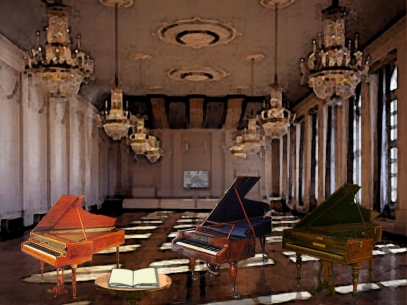Introduction - piano (II) after 1800
Two of the maybe most important events in piano history and music after 1800 had almost nothing to do with music: the Congress of Vienna 1815 and the first world exhibition in 1851.
After Napoleon's defeat the Congress of Vienna marked the end of wars in Europe and with it the end of the Continantal system and the British sea blockade which had not only the effect of blocking British goods from European markets but also caused the opposite effect of blocking European goods from any overseas markets. Now providing pianos overseas was no longer a British domain but British pianos got access to all other European countries too, as well as vice versa. Within a few years piano makers producing for only local and regional markets faced a European, and soon world-wide, competition.
The "Great Exhibition of the Works of Industry of All nations" soon nicknamed "World's fair" in the London Crystal Palace 1851 added to this even more. When suddenly the products of the piano workshops of Europe and Northern America stood side by side for comparison this soon led to the end of all "special" models no matter if personal, regional or esthetic specialties. The progressive century celebrated only the "best" and the most "progressive" products of its time, and only these could be sold in considerable number further on. From then on a wave of standardisation emerged which was felt particularly deeply in piano making. Within a few decades the cast iron frame (designed to withstand tropical climates), the action "à double echappement", the oblique bass stringing, the eight octaves' compass and at the end even the uniform black lacquering were standard and the 20th century "standard piano" was abundant. Since its components became standardised too, some piano makers just made frames themselves and put components produced by specialised deliverers inside.
The multitude of different piano sounds of German/Austrian, French or English grands of the time before 1850 was past - but a past which had originated most piano music still forming the piano repertoire. Beethoven, for instance, possessed a French, an English and numerous Viennese grands over his lifetime. Chopin's compositions sound remarkably differently on a grand from Paris, London or Vienna - and he had known from experience and played publicly all these instruments. The decisive criteria about a proper piano sound were settled then by Franz Liszt, who was very universal as a performer (he played more or less everything available during his virtuoso career) but had strong preferences as a piano teacher: powerful, able to compete in loudness and sound presence with a full orchestra in a great concert hall. The potential of a "singing" sound was out of date, it should also be "thundering".
© Greifenberger Institut für Musikinstrumentenkunde | info@greifenberger-institut.de




